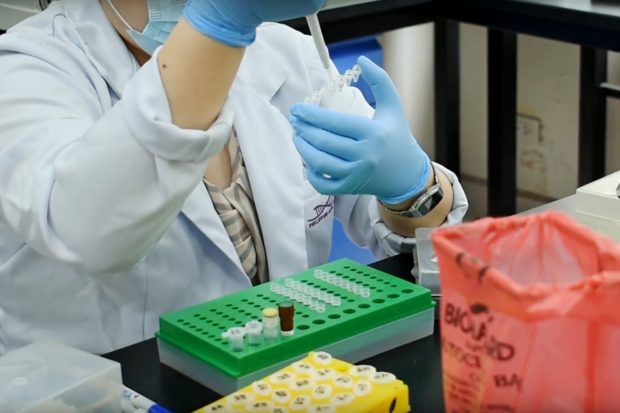PGC to check if 9 Filipino sailors of cargo ship from India carry ‘double mutant’ variant

VIRUS TRACKERS Dozens of molecular biologists, medical technicians and computer scientists work round the clock at the PGC laboratory in UP Diliman, Quezon City, to conduct biosurveillance, including finding significant mutations in the virus’ spike protein. CONTRIBUTED/ UP PHILIPPINE GENOME CENTER
MANILA, Philippines — Samples from nine Filipino seafarers of a cargo ship that arrived from India will undergo genome sequencing to determine if they were infected by the so-called double mutant variant of SARS-CoV-2, the Department of Health (DOH) said Tuesday.
Dr. Alethea De Guzman, director of the DOH’s Epidemiology Bureau, said that the 12 COVID-19 stricken crew members went through another swab test and 11 of them tested positive again for the new coronavirus. The 12th patient will undergo a confirmatory test.
“From the 11 na nagpositive, meron tayong siyam na eligible for sequencing kasi sapat ‘yung sample size, mababa ‘yung CT (cycle threshold) value, so ‘yun ang isasama sa ating kasunod na run,” she said in an online press briefing.
(From the 11 who tested positive, nine are eligible for sequencing because the sample size is enough and the CT value is low. So they will be included in the next run.)
The 12 are among 21 Filipino crew members of the MV Athens Bridge that docked in Manila on May 6. According to the Maritime Industry Authority, the vessel left India on April 22 and arrived in Haiphong, Vietnam, on May 1, where the 12 cases were detected.
READ: 2 critical COVID – stricken Filipino seafarers from India evacuated to PH
The planned genome sequencing of samples from the nine seafarers will principally identify if they are carriers of the double mutant variant, identified as B.1.617, of SARS-CoV-2 that was first reported in India, and also other variants of concern and variants under investigation.
READ: Infected crew of COVID-hit ship from India to be tested for virus variant — DOH
Dr. Cynthia Saloma, executive director of the Philippine Genome Center (PGC), said they may include the samples from the seafarers in the next run that will sequence 350 samples, or in a special batch that will only include 25 samples.
If the special test will be conducted, the results may be out by Thursday or Friday, but if it will be processed among 350 samples, the results may be released in four days, according to Saloma.
“But we are trying our best na dapat 24 hours lang, we can get the results, (so that we can get the results in 24 hours)” she added.
The genome sequencing of samples from the nine sailors comes as the DOH confirmed detecting two cases of the B.1.617 variant from two returning overseas Filipinos from Oman and the United Arab Emirates.
RELATED STORIES
India’s COVID-19 surge and the new variant: What we know
EXPLAINER: What we know about the Indian variant as coronavirus sweeps South Asia